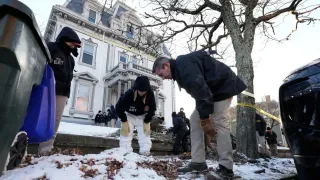June 24, 2014
HHC Launches First LGBT Health Clinic, in Harlem
Winnie McCroy READ TIME: 4 MIN.
On June 5, HHCs Metropolitan Hospital Center in East Harlem opened its new LGBT Health Center, which aims to better serve and remove barriers to care for New York City's lesbian, gay, bisexual and transgender populations. The Comprehensive LGBT Health Center will provide specialized and comprehensive primary, preventive and specialty care by professionals from doctors to administrators, who are trained to manage the health care and social needs of the LGBT community.
"So far I could say that the patients coming here have found the environment to be welcoming and nurturing. We at Metropolitan have gone through an intensive cultural competence training over the past year, and are showing great sensitivity to the needs of LGBT patients," said Dr. Nadia Duvilaire, who oversees patients in the Comprehensive LGBT Health Center.
Duvilaire said that the staff has learned to recognize and embrace gender identity so that when they have a transgender patient, they will address them with the correct pronoun, "because we do realize that it's for the patient's comfort and choice." The doctor said that this has really helped them welcome their influx of transgender patients, and hopes that moves like this will help bridge the gap in care for LGBT patients.
"HHC strives to ensure that all patients are treated with respect and receive patient-centered and culturally sensitive healthcare. This specialized clinic will provide an environment where patients feel welcome and comfortable, and it will serve as a center of excellence to share best practices and spread understanding across our system," said HHC President Dr. Ram Raju. "Our goal is to reduce barriers to healthcare so all New Yorkers can access the health services they need at any point of care in our system and without hesitation."
In many studies, LGBT patients admit that they don't reveal their true selves to their health care providers, which can prevent doctors from performing certain necessary screenings. For example, if a transgender person does not self-identify, doctors might not know to look for certain conditions if the patient is on hormonal therapy, or that MTF trans people still need prostate screenings or checks for testicular cancer. Even something as simple as realizing that LGBTs may be fathers or mothers and have issues around that is something Duvilaire and her team are on the lookout for.
This was the situation for Christopher Leo Daniels, a 50-year-old patient of the new clinic who says it is "way worth it" to travel across town to see his doctor. He heard about the clinic just as it was opening, and decided that he would start fresh at a place that was "a perfect fit."
"I don't want to be that guy who shows up and misses conversations with the doctor because of homophobia," said Daniels. "I could walk in and be myself and be treated well, exactly as expected. It surpassed my expectations."
Daniels shared stories with former health care providers that he said ranged anywhere from slightly awkward to outright disrespectful. He had some horror stories and some quietly uncomfortable moments before he decided to come to the new clinic. Sometimes, he said, he participated in a "conspiracy of silence" with doctors who didn't even know to ask the right questions.
His new doctors talk to him about specific things that are going on in the LGBT community. They ask if a patient identifies as a top or bottom, to help keep them safe. They don't conflate an LGBT clinic with an HIV clinic, as some health care providers will, and they know the lingo around transgender issues. Best of all, said Daniels, is that he can ask any question without fear of judgment.
"If every clinic was set up and the doctors trained this way, there would be a lot more welcoming and respectful vibe around LGBT health care," said Daniels.
The doctor hopes that this will happen, and that the Comprehensive LGBT Health Center will serve as a model pilot program for similar clinics throughout the greater New York City metropolitan area.
"First and foremost we want to provide adept care. Second, we would want Metropolitan to really foster the care for LGBT patients, because when you are looking at the geography of specific care provided for LGBT patients, it is centered in downtown NYC," said Duvilaire. "There is nothing in between, and nothing up in the Bronx. If we could provide patients with another place that is strong, welcoming, competent and efficient, that is our goal."
The Metropolitan Hospital Comprehensive LGBT Health Center is located at 1901 First Avenue at 97th Street, 4th Floor. It is open Saturdays, from 9 a.m. to 5 p.m., by appointment only. To schedule an appointment or speak with a member of the LGBT Health Center staff, call 212-423-7292 or e-mail [email protected].






